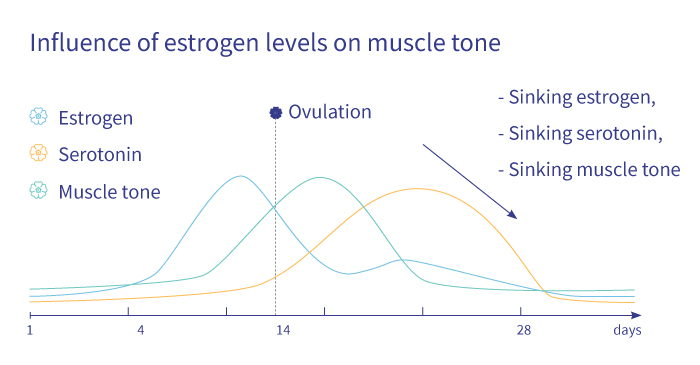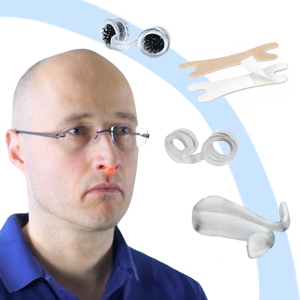Snoring is percieved to be a man’s problem. It is a fact that there are more men that snore than women. In addition, snoring is almost a taboo topic for women – after all, it’s not exactly a lady-like subject. But studies and statistics show that women snoring is more common than you might think. So, what really helps women stop snoring? Is their snoring caused by the same factors that cause men to snore? We will answer that and give you an overview of snoring aids for women – from the snoring mouthpiece which is optimized for the size of the female jaw to small nasal dilators.
Facts and Figures
The proportion of women snoring increases sharply with their age. While women snoring is barely represented among the under 30 year-olds (~ 5%), the proportion of female snorers in the age group of 30-50 year-olds is already rising significantly to 15-20%. From menopause onwards, snoring affects almost as many women as men (~40%). In comparison to women, snoring is much more prevalent in younger men, but there are only moderate increases in the number of men that start snoring as they get older.
The fact is that snoring is not uncommon among the female population. However, it is often difficult for women to talk about snoring. This is a problem, because snoring can conceal dangerous diseases such as sleep apnea. That’s why snoring women should swallow their pride and at least consult a doctor.
Cause of Women Snoring
In General
Do women snore differently? Yes and no. The reason why women snore is often the same as that of men. The airways are constricted, vibrations are triggered in the pharyngeal cavity, which then leads to snoring. An unhealthy lifestyle can make the problem worse. Being overweight, alcohol consumption, smoking and certain medications for example, facilitate the constriction of the respiratory tract and promote the loss of pharyngeal muscle tone.
Hormones Are to Blame
Ein Faktor, der bei den Damen eine größere Rolle spielt, ist der Östrogenspiegel. Das weibliche Sexualhormon Östrogen wird in den Eierstöcken gebildet, sorgt vor allem für die Reifung der Eizellen und hilft beim Knochenaufbau. Außerdem hat es Einfluss auf den Serotoninspiegel.

Estrogen
A major factor that plays a role in women snoring is their estrogen levels. The female sex hormone estrogen, which is formed in the ovaries, first and foremost ensures that the ovum matures properly and supports bone formation. Additionally, estrogen also influences serotonin levels.
Serotonin
Serotonin, a neurotransmitter in the brain – also known as one of the endorphins – is, among other things, relevant to maintaining muscle tension. If there is less estrogen available, then levels of serotonin go down as well. As a consequence, muscle tone decreases and the airways become more lax during the night, which makes them more prone to collapse.
Menopause
This explains why the rate of women snoring rises sharply after menopause sets in. During menopause, the ovaries cease activity and no longer produce estrogen, or hardly any. Women who suffer from premature ovarian failure (POF) for instance, are already estrogen-deficient at an early age, which means they already have an increased risk of snoring at a younger age.
Combined oral contraceptive pill (COCP)
Younger women begin to snore when they start taking the birth control pill. This is closely linked to the hormonal balance, which is disturbed in the short run by the hormones in the pill. After a few days, however, the hormone balance returns to normal. This should also cause the snoring to fade. If that isn’t the case, it makes sense to think about switching to a different medication.

Snoring During Pregnancy
About one out of four woman snore during pregnancy. This might be caused by coughs and colds during pregnancy or simply the weight increase.
Snoring Tips
Balanced Diet
In order to bring your estrogen levels into balance, adequate nutrition is an important factor. A low-carb diet is ideal for that purpose, in which case you should consume foods rich in carbohydrates only once in a while. Products that contain plenty of vitamins and omega-3 fatty acids should be eaten more often (this includes vegetables and fish).

Behavioural Therapy
If women snore because of their unhealthy lifestyle, then there may be quite a few things that can be done to improve the situation. It is important, that one gives up a few inconvenient habits, though.
Those who do sports on a regular basis and who abstain from smoking cigarettes and alcohol consumption have already mitigated their risk profile considerably.
Schnarchtest
If the snoring issue cannot be dealt with that easily or because changing your lifestyle is not doable, there is still hope! There are many other means to tackle snoring. Nevertheless, for that purpose you still have to first find out from what type of snoring you are suffering. Our snoring test can help you with that. Our test provides you, not only, with an analysis of your snoring causes but also with specific recommendations on what will help you stop your snoring.
Nasal dilator purchasing advisor
What must you take into consideration when making a purchase? See all our nasal dilators presented here.
Positional therapy purchasing guide
Helps you make an informed buying decision when buying a positional therapy device, such as an anti-snoring vest or anti-snoring backpack.
Mandibular advancement device (MAD) purchasing guide
Advises you what you should pay attention to when buying a mandibular advancement device (MAD). We present different models and technical approaches here.
Medical Doctor, Berlin
Jan Wrede works as a medical doctor in Berlin. He studied medicine at FAU University in Erlangen-Nuremberg and Semmelweis University in Budapest. He had already written numerous scientific articles during his studies, especially on the subject of snoring.







